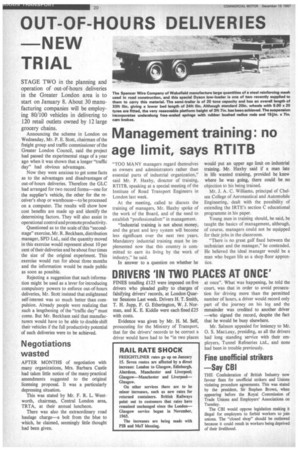OUT-OF-HOURS DELIVERIES NEW TRIAL
Page 22

If you've noticed an error in this article please click here to report it so we can fix it.
STAGE TWO in the planning and operation of out-of-hours deliveries in the Greater London area is to start on January 8. About 30 manufacturing companies will be employing 80/100 vehicles in delivering to 120 retail outlets owned by 12 large grocery chains.
Announcing the scheme in London on Wednesday, Mr. P. E. Stott, chairman of the freight group and traffic commissioner of the Greater London Council, said the project had passed the experimental stage of a year ago when it was shown that a longer "traffic day" had obvious advantages.
Now they were anxious to get some facts as to the advantages and disadvantages of out-of-hours deliveries. Therefore the GLC had arranged for two record forms—one for the supplier's vehicle, the other for the receiver's shop or warehouse—to be processed on a computer. The results will show how cost benefits are made up and identify the determining factors. They will also assist in operational control and promote productivity.
Questioned as to the scale of this "secondstage" exercise, Mr. R. Beckham, distribution manager, SPD Ltd., said the quantity moved in this exercise would represent about 10 per cent of their deliveries and be about four times the size of the original experiment. This exercise would run for about three months and the information would be made public as soon as possible.
Rejecting a suggestion that such information might be used as a lever for introducing compulsory powers to enforce out-of-hours deliveries, Mr. Stott insisted that enlightened self-interest was so much better than compulsion. Already people were realizing that such a lengthening of the "traffic day" must come. But Mr. Beckham said that manufacturers would have to be able to double shift their vehicles if the full productivity potential of such deliveries were to be achieved.
Negotiations wasted
AFTER MONTHS of negotiation with many organizations, Mrs. Barbara Castle had taken little notice of the many practical amendments suggested to the original licensing proposal. It was a particularly depressing situation.
This was stated by Mr. F. R. L. Wentworth, chairman, Central London area, TRTA, at their annual luncheon.
There was also the extraordinary road haulage charge—a bolt from the blue to which, he claimed, seemingly little thought had been given.












































































































